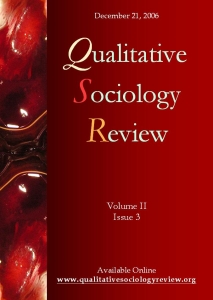An Interview with Kathy Charmaz: On Constructing Grounded Theory
DOI:
https://doi.org/10.18778/1733-8077.2.3.02Downloads
References
Bryant, Antony and Kathy Charmaz, editors (2007, forthcoming) Handbook of Grounded Theory. London: Sage.
Google Scholar
DOI: https://doi.org/10.4135/9781848607941
Charmaz, Kathy (1980) The Social Reality of Death. Reading. MA: Addison-Wesley.
Google Scholar
Charmaz, Kathy (1991) Good Days, Bad Days: The Self in Chronic Illness and Time. New Brunswick, NJ: Rutgers University Press.
Google Scholar
Charmaz, Kathy (2000) “Grounded Theory Methodology: Objectivist and Constructivist Qualitative Methods.” Pp. 509-535 in Handbook of Qualitative Research, 2nd Edition, edited by N. K. Denzin and Y.S. Lincoln. Thousand Oaks, CA: Sage.
Google Scholar
Charmaz, Kathy (2005) “Grounded Theory in the 21st Century: Applications for Advanced Social Justice Studies.” Pp. 507-535 in Handbook of Qualitative Research, 3rd Edition, edited by N. K. Denzin and Y. S. Lincoln. Thousand Oaks, CA: Sage.
Google Scholar
Charmaz, Kathy (2006) Constructing Grounded Theory: A Practical Guide Through Qualitative Analysis. London: Sage.
Google Scholar
Charmaz, Kathy, Glennys Howarth and Allan Kellehear, editors (1997) The Unknown Country: Death in Australia, Britain and the U.S.A. London: McMillan; New York: St. Martin’s.
Google Scholar
DOI: https://doi.org/10.1007/978-1-349-25593-1
Charmaz, Kathy and Debora A. Paterniti, editors (1999) Health, Illness, and Healing: Society, Social Context, and Self. Los Angeles: Roxbury.
Google Scholar
Denzin, Norman (1997) Interpretive Ethnography: Ethnographic Practices for the 21st Century. Thousand Oaks, CA: Sage.
Google Scholar
DOI: https://doi.org/10.4135/9781452243672
Garfinkel, Harold (1967) Studies in Ethnomethodology. Englewood Cliffs, NJ: Prentice Hall.
Google Scholar
Glaser, Barney (1992) Basics of Grounded Theory Analysis. Mill Valley, CA: The Sociology Press.
Google Scholar
Glaser, Barney (2002) “Constructivist Grounded Theory?” Forum: Qualitative Social Research 3(3). Retrieved 15 October 2006 http://www.qualitative-research.net/fqs-texte/3-02/3-02glaser-e.htm
Google Scholar
Glaser, Barney and Anselm Strauss (1967) The Discovery of Grounded Theory. Chicago, IL: Aldine.
Google Scholar
Goldthorpe, John (2000) On Sociology: Numbers, Narratives and the Integration of Research and Theory. Oxford, UK: Oxford University Press.
Google Scholar
Gubrium, Jaber and Kathy Charmaz, editors (1992) Aging, the Self, and Community. Greenwich, CT: JAI Press.
Google Scholar
Henwood, Karen and Nicholas Pidgeon (2003) “Grounded Theory in Psychological Research.” Pp. 131-155 in Qualitative Research in Psychology: Expanding Perspectives in Methodology and Design, edited by P.M. Camic, J.E. Rhodes and L. Yardley. Washington, DC: American Psychological Association.
Google Scholar
DOI: https://doi.org/10.1037/10595-008
Huber, Joan (1973) “Symbolic Interaction as a Pragmatic Perspective: The Bias of Emergent Theory.” American Sociological Review 38:278-284.
Google Scholar
DOI: https://doi.org/10.2307/2094400
Kuhn, Thomas (1962) The Structure of Scientific Revolutions. Chicago: University of Chicago Press.
Google Scholar
Maines, David (2001) The Faultline of Consciousness: A View of Interactionism in Sociology. New York, NY: Alan de Gruyter.
Google Scholar
Mann, Thomas (1973) The Magic Mountain. New York, NY: Alfred A. Knopf.
Google Scholar
Mead, George Herbert (1932) Philosophy of the Present. LaSalle, IL: Open Court Press.
Google Scholar
Strauss, Anselm and Juliet Corbin (1998) Basics of Qualitative Research: Grounded Theory Procedures and Techniques, 2nd Edition. Thousand Oaks, CA: Sage.
Google Scholar
Ulmer, Jeffrey and Mindy Wilson (2003) “The Potential Contributions of Quantitative Research to Symbolic Interactionism.” Symbolic Interaction 26(4):531-552.
Google Scholar
DOI: https://doi.org/10.1525/si.2003.26.4.531
Downloads
Published
How to Cite
Issue
Section
License

This work is licensed under a Creative Commons Attribution-NonCommercial-NoDerivatives 4.0 International License.











